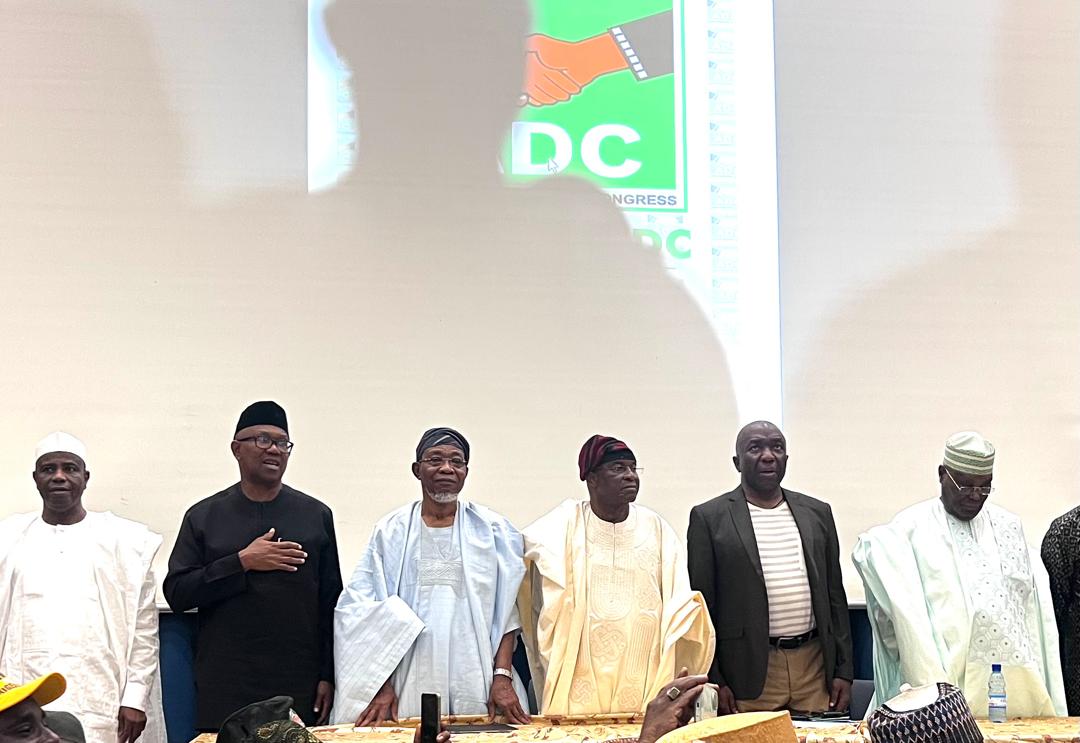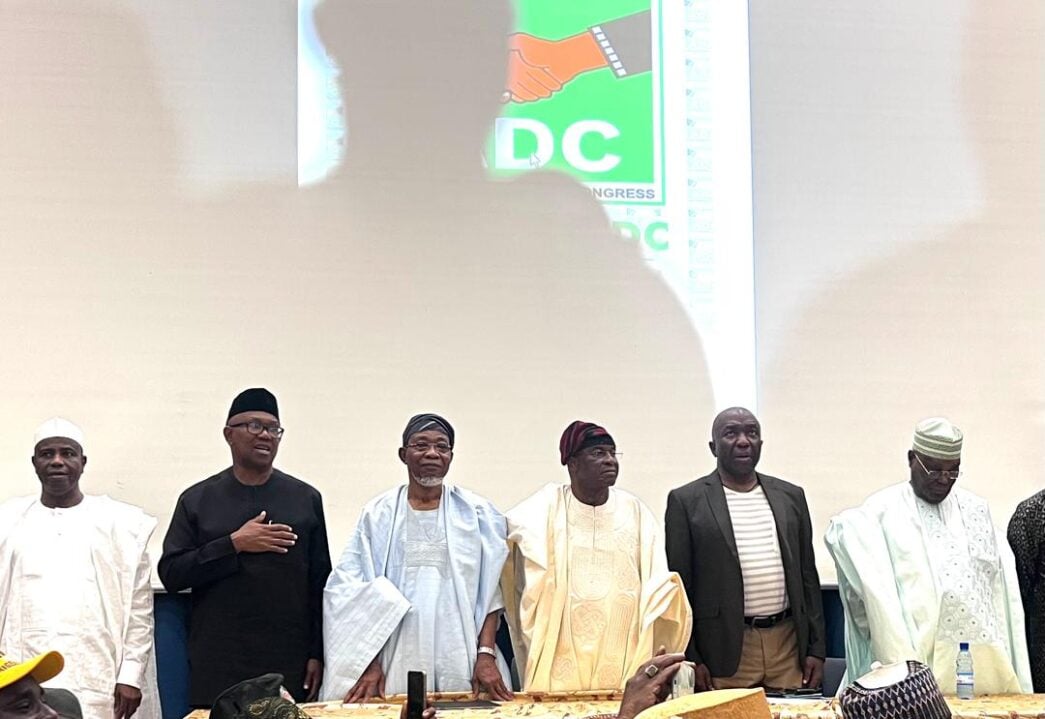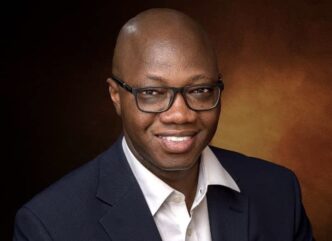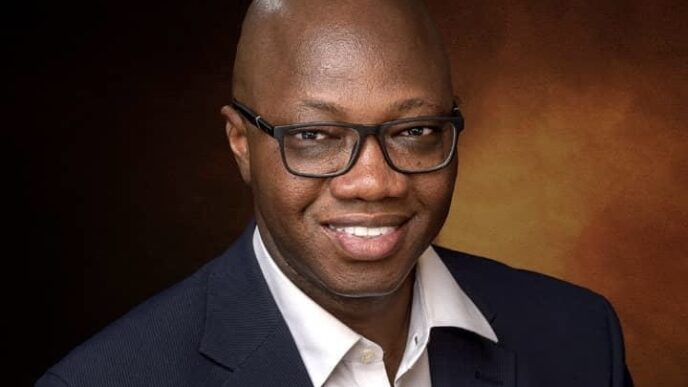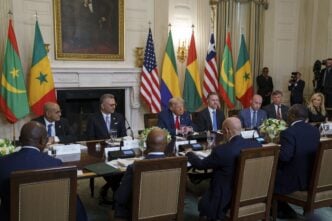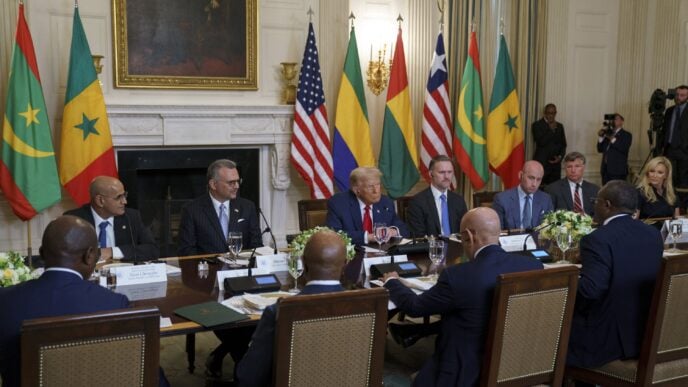BY SANI DANAUDI MOHAMMED
The ADC coalition’s emergence has sparked debates about whether Nigerians can trust this new alliance, with some questioning if it is merely “same faces, new platform”. History has shown that similar coalitions—such as the APC’s merger of the CPC, ACN, and ANPP—can be successful; however, others have faltered due to underlying tensions and mistrust. Can the ADC coalition prove itself different, or will it succumb to the same challenges that have plagued previous alliances?
The formation of coalitions in Nigerian politics has been a recurring theme, with various political parties and heavyweight politicians coming together to achieve common goals. In 2013, a merger of some political parties, including Tinubu’s ACN, former President Buhari’s CPC, ANPP, and a faction of the PDP led by notable politicians such as Atiku Abubakar, Rabiu Kwankwaso, Bukola Saraki, and Rotimi Amaechi, resulted in the formation of the All Progressives Congress (APC). This coalition played a significant role in ending the PDP’s 16-year rule in March 2015, when Goodluck Jonathan lost to former President Muhammadu Buhari.
The All Progressives Congress (APC) was a coming together of three major camps: Buhari’s Congress for Progressive Change (CPC), which originated from The Buhari Organisation (TBO) and was formed in 2006 by Muhammadu Buhari and his political allies; Asiwaju Bola Tinubu’s Action Congress of Nigeria (ACN), known for its strong regional presence and mobilisation efforts; and Ogbonnaya Onu’s All Nigeria Peoples Party (ANPP), each bringing their unique histories, strengths, and contributions to the newly formed party.
Advertisement
The APC brought together a diverse group of politicians, including Mallam Nasir el-Rufai, Abubakar Malami SAN, Chibuike Rotimi Amaechi, and Rauf Aregbesola, among others. These individuals became major players in the Buhari government, shaping the country’s policies and direction. However, over time, some of these individuals have left the APC and joined other political parties, including the African Democratic Congress (ADC).
Recently, a new coalition led by former Vice President Atiku Abubakar, who was the PDP presidential candidate in the last elections, has emerged. This coalition includes other notable politicians such as Peter Obi, the former Labour Party presidential candidate; former Senate President David Mark; former Governor of Rivers State and former Minister in the Buhari administration, Rotimi Amaechi; and the founding Chairman of the APC, John Oyegun, among others. Nigerians have been asking questions about the purpose of this coalition beyond capturing power.
The big question on everyone’s mind is whether this present ADC coalition is different from the APC coalition of 2014. Can it be trusted? Many are of the opinion that as long as it is the same faces, it is another illusion rather than a genuine attempt at governance. The concern is that this coalition may be more focused on capturing power than solving the nation’s problems.
Advertisement
One of the key differences between the APC coalition of 2014 and the ADC coalition of today is the context in which they were formed. The APC coalition was formed to challenge the PDP’s grip on power in response to the perceived failures of the PDP government. The ADC coalition, on the other hand, is being formed in a different context, with the APC now in power and facing its own set of challenges.
Another difference lies in the composition of the coalitions. While the APC coalition brought together a diverse group of politicians, the ADC coalition appears to consist largely of individuals who have been part of the APC or other parties in the past. This has raised questions about whether the coalition is genuinely committed to change or merely regrouping familiar faces.
The APC achieved its goal of ending PDP rule, but it has faced numerous challenges since coming to power. The party has struggled with internal conflicts, and some of its key leaders have exited. It remains to be seen whether the ADC coalition will be able to achieve its objectives and provide a genuine alternative to the APC.
In evaluating the trustworthiness of the ADC coalition, Nigerians will need to look beyond the personalities involved and examine the coalition’s policies and commitment to governance. Will it prioritise the needs of the Nigerian people, or will it be driven by personal interests? Only time will tell.
Advertisement
The emergence of the ADC coalition has sparked a national conversation about the need for new leadership and a fresh approach to governance. Nigerians are eager to see whether this coalition can deliver on its promises and provide a better future for the country.
Ultimately, the success of the ADC coalition will depend on its ability to connect with the Nigerian people and demonstrate a genuine commitment to solving the nation’s problems. If it can do this, it may build trust with Nigerians and provide a viable alternative to the APC. However, if it fails to deliver, it may be seen as just another illusion, and Nigerians may continue to suffer under poor governance.
In Germany, the grand coalition between the Christian Democratic Union (CDU) and the Social Democratic Party (SPD), formed in 2018, aimed to address pressing national issues such as climate change, economic growth, and social welfare. This coalition brought together two major parties with different ideologies to work towards common goals, ensuring stability and progress in the country. Through collaborative governance, they implemented policies that benefited the broader population, such as increasing renewable energy production and improving healthcare systems.
In India, the National Democratic Alliance (NDA) coalition, led by the Bharatiya Janata Party (BJP), has been instrumental in driving economic reforms and development projects. By bringing together various regional parties, the NDA has maintained a stable government and implemented policies that promote economic growth, infrastructure development, and social welfare. The coalition’s focus on inclusive growth and community participation has helped to address some of the country’s most pressing challenges, such as poverty and inequality.
Advertisement
The ADC coalition in Nigeria can draw lessons from these examples by prioritising community participation and democracy. To regain the trust of the masses, the coalition must move beyond mere press statements and demonstrate a real commitment to returning power to the people. This can be achieved by implementing policies that promote transparency, accountability, and inclusivity, and by ensuring that decision-making processes are decentralised and participatory.
Nigerians may be sceptical about trusting another coalition, such as the ADC, after the APC’s perceived failures, because they have seen the same faces and interests dominate both parties. This has led to a lack of confidence in the ability of these politicians to deliver meaningful change. The APC’s inability to fulfil its promises and address pressing issues like economic stagnation, insecurity, and corruption has created disillusionment, making Nigerians wary of yet another coalition that may promise change but fail to deliver. For the ADC coalition to gain trust, it would need to demonstrate a clear break from the past, a genuine commitment to transparency, accountability, and the welfare of the Nigerian people, and a willingness to prioritise the needs of the masses over the interests of the elite.
Advertisement
The difference lies in their underlying motivations and goals: the APC was formed as a merger of opposition parties to challenge the PDP’s hold on power, driven by a desire for change and a need for a fresh alternative; whereas the ADC coalition appears to be a regrouping of familiar faces from various parties—including former APC members—potentially focused more on capturing power, driven by a mix of ideological, personal, and political interests. This distinction in motivations may shape their approaches to governance and policy-making.
The difference in their formations is also notable: the APC was created through a formal merger of several parties, including ACN, CPC, and ANPP, with structured leadership and a defined set of goals. The ADC coalition, however, seems to be an informal alliance of individuals from different parties, united by a shared goal of challenging the current administration—but potentially divided by differing ideologies, interests, and agendas. This difference may impact their cohesion, decision-making processes, and ability to deliver on promises.
Advertisement
Other parties like the PDP, NNPP, Labour Party, and SDP are navigating internal dynamics, while the newly embraced ADC is still battling an unhealed political virus. A recent court case has called for the removal of the party’s interim executives by certain groups within the party, further complicating its internal affairs.
Opposition parties have continued to blame the APC-led administration for infiltrating their ranks, but the president has maintained that, as a democrat, he cannot intervene in the crises plaguing opposition parties. He has also dismissed claims of turning Nigeria into a one-party state, asserting his commitment to democratic principles and allowing each party to resolve its internal issues independently.
Advertisement
The question on many Nigerians’ minds is whether they can trust the ADC coalition, given concerns that it may be “same faces, different platforms”. With familiar figures from other parties joining the ADC, some worry that this might be a case of old wine in new bottles, rather than a genuine effort to bring about change. This perception could impact the party’s credibility and its ability to attract genuine support from Nigerians seeking meaningful alternatives.
The ADC must prioritise unity and collective purpose over personal interests to succeed. By putting aside individual ambitions and working together towards a common goal, the coalition can harness its diverse strengths and experiences to build a strong, cohesive movement capable of challenging the ruling party and delivering positive change. If personal interests dominate, the coalition risks fragmentation and failure, undermining its ability to fulfil its promises to the Nigerian people.
Unless the masses see tangible evidence of power being returned to them, they will remain sceptical of another coalition of interests. The ADC must define a new politics that prioritises the needs and aspirations of the people, rather than serving the interests of the elite. The coalition has a tall order to fill, but also an opportunity to shape Nigeria’s future and provide a new direction for the country. Whether it will succeed or fail remains to be seen—but one thing is certain: Nigerians are watching closely.
Danaudi writes from Bauchi via [email protected]
Views expressed by contributors are strictly personal and not of TheCable.
